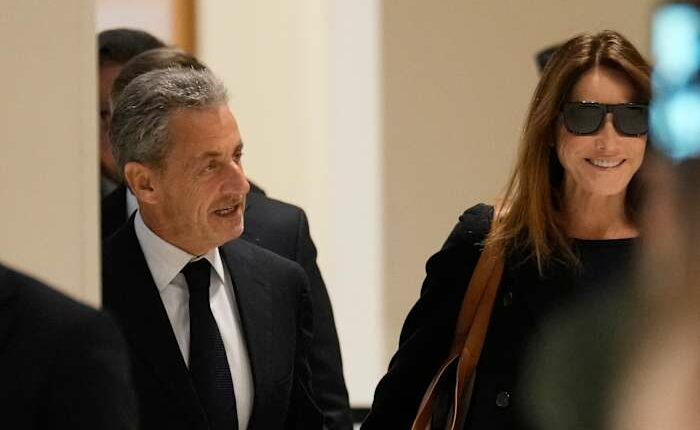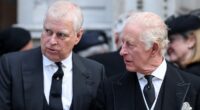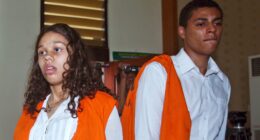Share this @internewscast.com

PARIS – Former French President Nicolas Sarkozy appeared in a Paris court on Thursday to hear the verdict regarding allegations of illegal financing for his 2007 presidential campaign by then-Libyan leader Moammar Gadhafi’s government.
Sarkozy, escorted by his wife, singer and model Carla Bruni-Sarkozy, entered a courtroom filled with both reporters and onlookers. Seated in the front row among the defendants, Sarkozy was accompanied by his three adult sons who were also present.
If convicted, the 70-year-old Sarkozy would be the first former French president found guilty of accepting illegal foreign funds to win office.
Having been elected in 2007 and defeated in the 2012 reelection, Sarkozy asserted his innocence during a three-month trial earlier in the year. The trial included 11 other defendants, among them three former ministers.
Despite various legal issues overshadowing his presidency, Sarkozy remains a significant figure in French right-wing politics and cultural circles, largely due to his marriage to Bruni-Sarkozy.
Sarkozy can appeal a guilty verdict, which would suspend the sentence pending the appeal. Prosecutors have argued for a seven-year prison sentence.
Alleged Libya financing
The allegations date back to 2011 when a Libyan news outlet and Gadhafi himself claimed that Libya had covertly contributed millions of euros to Sarkozy’s 2007 campaign.
In 2012, the investigative platform Mediapart revealed what it claimed was a Libyan intelligence memo detailing a 50 million-euro funding agreement. Sarkozy criticized the document as fraudulent and initiated a defamation lawsuit.
French magistrates later said that the memo appeared to be authentic, though no conclusive evidence of a completed transaction was presented at the three-month Paris trial.
Investigators also looked into a series of trips to Libya made by people close to Sarkozy when he served as interior minister from 2005 and 2007, including his chief of staff.
In 2016, Franco-Lebanese businessman Ziad Takieddine told Mediapart that he had delivered suitcases filled with cash from Tripoli to the French Interior Ministry under Sarkozy. He later retracted his statement.
That reversal is now the focus of a separate investigation into possible witness tampering. Both Sarkozy and his wife, Carla Bruni-Sarkozy, were handed preliminary charges for involvement in alleged efforts to pressure Takieddine. That case has not gone to trial yet.
Takieddine, who was one of the co-defendants, died on Tuesday in Beirut, his lawyer Elise Arfi said. He was 75. He had fled to Lebanon in 2020 and did not attend the trial.
Sarkozy was tried on charges of passive corruption, illegal campaign financing, concealment of the embezzlement of public funds and criminal association. Prosecutors alleged that Sarkozy had knowingly benefited from what they described as a “corruption pact” with Gadhafi’s government.
Libya’s longtime dictator was toppled and killed in an uprising in 2011, ending his four-decade rule of the North African country.
Sarkozy denounced a ‘plot’
The trial shed light on France’s back-channel talks with Libya in the 2000s, when Gadhafi was seeking to restore diplomatic ties with the West. Before that, Libya was considered a pariah state.
Sarkozy has dismissed the allegations as politically motivated and reliant on forged evidence. During the trial, he denounced a “plot” he said was staged by “liars and crooks” including the “Gadhafi clan.”
He suggested that the allegations of campaign financing were retaliation for his call — as France’s president — for Gadhafi’s removal.
Sarkozy was one of the first Western leaders to push for military intervention in Libya in 2011, when Arab Spring pro-democracy protests swept the Arab world.
“What credibility can be given to such statements marked by the seal of vengeance?” Sarkozy asked in comments during the trial.
Stripped of the Legion of Honor
In June, Sarkozy was stripped of his Legion of Honor medal — France’s highest award — after his conviction in a separate case.
Earlier, he was found guilty of corruption and influence peddling for trying to bribe a magistrate in 2014 in exchange for information about a legal case in which he was implicated.
Sarkozy was sentenced to wear an electronic monitoring bracelet for one year. He was granted a conditional release in May due to his age, which allowed him to remove the electronic tag after he wore it for just over three months.
In another case, Sarkozy was convicted last year of illegal campaign financing in his failed 2012 reelection bid. He was accused of having spent almost twice the maximum legal amount and was sentenced to a year in prison, of which six months were suspended.
Sarkozy has denied the allegations. He has appealed that verdict to the highest Court of Cassation, and that appeal is pending
Copyright 2025 The Associated Press. All rights reserved. This material may not be published, broadcast, rewritten or redistributed without permission.











